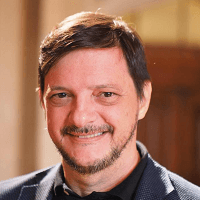
Manoel P. Galvao Neto MD, MSC, FASGE, IFASBMS
Gastroenterology, Bariatric Surgery
Sao Paulo, Sao Paulo, Brazil
Connect with the speaker?
Dr. Manoel Galvao Neto graduated with a degree in Medicine at Bahiana School of Medicine, Bahia, Brazil, in 1989. After finishing a digestive surgery and endoscopy residency program at the 9th of July Hospital in Sao Paulo, Brazil, he returned to Bahia as an assistant professor of Surgery at Bahia School from 1993 until1998. From 1998 to 2000, he was the Coordinator of the Experimental Surgery Research Group. Inspired by the work of his father, Dr. Manoel Galvao Filho—a surgeon who had pioneered laparoscopic surgery in Brazil—and by his beloved mother, Stella—a leading operating room nurse who delineated his character, behavior, and ethics. Dr. Galvao developed models of video laparoscopic surgery in rats, using conventional instruments that have helped train over a thousand medical students. In 2003, this work was presented and defended as his Master’s Degree thesis at São Paulo University proving that medical students, without any formal surgical training, are capable of performing laparoscopic procedures in rats. Dr. Galvao is also a board-certified specialist in Digestive Surgery by the Brazilian College of Digestive Surgery (CBCD), in Gastroenterology by the Brazilian Federation of Gastroenterology (FBG) and in Digestive Endoscopy by the Brazilian Society of Digestive Endoscopy (SOBED). He is one of only a few clinicians that have all three of these board certifications.
From 1993 to 2000, Dr. Galvao was an instructor for the General Surgery residency program at Cleriston Andrade Hospital in Feira de Santana, Bahia, Brazil. From 1999 to 2000, he worked as an assistant surgeon at São Rafael Hospital, Salvador, Bahia, where he was a surgical proctor and responsible for the training of the clinicians on the esophageal manometry service. At the same time, Dr. Galvao established a busy practice performing thousands of endoscopies, hundreds of laparoscopic surgeries, and at least 50 esophagectomies for Chagas megaesophagus.
From 1993 to 2000, Dr. Galvao was an instructor for the General Surgery residency program at Cleriston Andrade Hospital in Feira de Santana, Bahia, Brazil. From 1999 to 2000, he worked as an assistant surgeon at São Rafael Hospital, Salvador, Bahia, where he was a surgical proctor and responsible for the training of the clinicians on the esophageal manometry service. At the same time, Dr. Galvao established a busy practice performing thousands of endoscopies, hundreds of laparoscopic surgeries, and at least 50 esophagectomies for Chagas megaesophagus.
EVENTS & ACTIVITIES (Speaking, Spoken, and Authored)
Gastrointestinal Control of Metabolism (Z6)
In-Person Event
Gastroenterology ...
May 09 - 13, 2017
Copenhagen, Copenhagen (Hovedstaden), DK
XIV International Course of Bariatric Surgery and Metabolic
In-Person Event
Bariatric Surgery
May 08 - 09, 2017
Barcelona, Cataluna, ES
2014 SAGES Scientific Session and Postgraduate Course Society of American Gastrointestinal Endoscopic Surgeons (SAGES)
In-Person Event
Gastroenterology ...
Apr 02 - 05, 2014
Salt Lake City, Utah, USA

